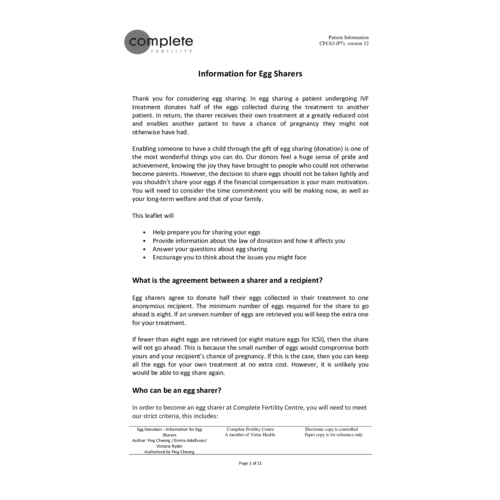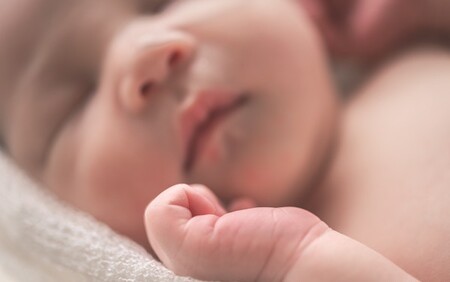Egg sharing
Why egg share?
Enabling someone to have a child through the gift of egg sharing is one of the most wonderful things you can do.
Our donors feel a huge sense of pride and achievement, knowing the joy they have brought to people who may not otherwise become parents.
What is egg sharing?
Egg sharing is a positive and generous act that gives another woman the chance of having a baby.
Egg sharing involves giving half of your total eggs collected during your IVF cycle to an anonymous recipient who is unable to produce good quality eggs of her own. This gives both you and the egg recipient the chance of having a baby.
During IVF your ovaries are stimulated with often 10 to12 eggs being produced. UK law allows only one or two fertilised eggs (embryos) to be transferred to the womb. The remaining embryos can be frozen although in most cases these aren't all used, even for subsequent treatments. Egg sharing allows these eggs to be shared with a woman who needs them.
What's involved Egg sharer Egg recipient Their situation Produces healthy eggs but needs IVF treatment Needs donors eggs as cannot produce good quality eggs or any eggs at all A mutually beneficial solution Shares half her eggs with an egg recipient and receives price-reduced IVF treatment Receives healthy eggs enabling her to proceed with fertility treatment With a mutual outcome: Both couples have a healthy chance of having a baby through fertility treatment.
Who can egg share?
Our egg sharing programme is open to all women including heterosexual and lesbian couples and single women.
To be eligible for our egg sharing programme a woman must:
• Be between the ages of 18 and 35 years
• Be a non-smoker for at least three months
• Be fit and healthy with a BMI between 20 and 30
• Have measurements of ovarian reserve (an indication of egg supply) within the normal range
• Have no previous history of low ovarian response to ovarian stimulation for IVF
• Have both ovaries in place
• Have no personal history of transmissible diseases
• Have no personal or family history of inheritable diseases
• Have no polycystic ovarian disease
• Have no fallopian tube disease
• Have no history of endometriosisHow to become an egg sharer
Please read through the information for egg sharers.
You can start the egg share programme through an initial consultation with a consultant to discuss your fertility history, the results of investigations (arranged by your GP for NHS patients, and by Complete for private patients) and ultrasound scan, the pros and cons of treatment options, if assisted conception is required, and the best treatment option.
Private patients can make an appointment without a GP referral, and these private appointments are sooner than NHS appointments.
Your GP or Consultant Gynaecologist can refer you to Complete Fertility Centre if you would like to proceed initially as an NHS patient.
If you’d like to discuss egg sharing further or book an initial appointment, please call our friendly donor team on 02380 010 575 or complete the enquiry form below.
Egg sharing success rates
Research shows that sharing eggs does not reduce the egg sharer’s chances of a successful pregnancy.
Here at Complete Fertility our IVF through egg share success rates are excellent.
Who needs your eggs?
Donated eggs may be offered to egg recipient women suffering premature menopause, those whose egg quality is poor or do not have eggs, who are infertile following cancer treatment or have a genetic condition they do not want to pass on to their offspring.
Find out about Leanne's story.
Anonymity
Egg sharers are anonymous to their recipients.
However you should be aware that at the age of 18, donor conceived offspring can make an application to find out identifying information about the donor. This information includes full name (including previous names), date and place of birth and last known postal address of their donor.
As an egg donor you can find out how many children, their sex and age of any children born as a result of your donation.
Responsibility
The egg recipient is responsible for any child born following donation. The egg donor does not have any legal rights to the child.
Counselling
All egg sharers and egg recipients must see our Counsellor before they start treatment to explore the issues of donating and receiving eggs and to offer support during this emotional and stressful time.
Apply now
To find out more about egg sharing please contact us or enquire below.

